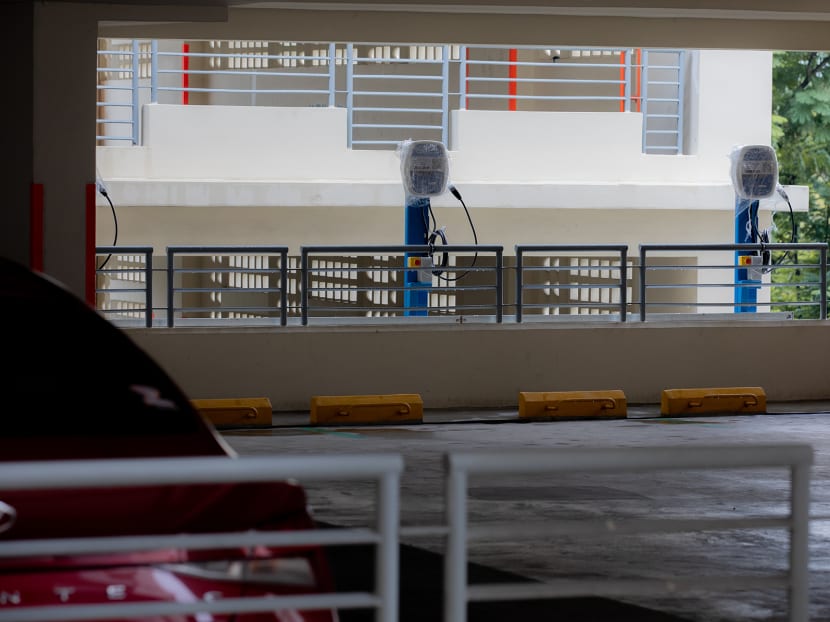All HDB car parks to have at least 3 electric vehicle charging points by 2025
SINGAPORE — All Housing and Development Board (HDB) towns will be ready for electric vehicles by 2025, with at least three charging points installed in each of these 2,000 car parks by then, Minister for Transport S Iswaran said in Parliament on Tuesday (March 8).

All HDB car parks will have at least three electric vehicle charging points by 2025.
- By 2025, all HDB car parks will have at least three electric vehicle charging points
- Singapore aims to cut carbon emissions from land transport by 80 per cent from its 2016 peak
- Transport Minister S Iswaran announced these moves in Parliament during a joint segment on the Singapore Green Plan
- To support adoption of electric cars, LTA is allowing more powerful electric cars to fall under Category A in the COE bidding exercise
- The electrification of public transport will also be ramped up
SINGAPORE — All Housing and Development Board (HDB) towns will be ready for electric vehicles by 2025, with at least three charging points installed in these 2,000 car parks by then, Minister for Transport S Iswaran said in Parliament on Tuesday (March 8).
The Government previously aimed to have charging stations in the car parks of eight HDB towns by 2025.
Announcing the accelerated timeline in a joint segment by various ministries on the Singapore Green Plan, Mr Iswaran said that the move was in line with the national target of achieving net zero emission by the middle of the century.
The Ministry of Transport on its part plans to reduce carbon emissions from land transport by 80 per cent from its peak in 2016 "by or around the mid-century".
Land transport emissions peaked at 7.7 million tonnes of carbon dioxide equivalent in 2016. An 80 per cent reduction will bring equivalent carbon emissions to 1.54 million tonnes.
"This is an ambitious goal that will require policy moves, new technologies, and behavioural shifts across our land transport system. Along with the decarbonisation of the power grid, electrification of vehicles is a key initiative that will have a material impact," said Mr Iswaran.
"Range anxiety" is a commonly cited impediment to adopting electric cars, he added, noting that an average driver in Singapore needs to fully charge his electric car only once every five to seven days.
"Nevertheless, this concern over nascent technology is understandable. To take the anxiety out of range, chargers must be widely available," he said.
The Land Transport Authority (LTA) in a factsheet to the media said that a large-scale tender will be launched for HDB car parks in the first half of 2022, and more than three chargers could be deployed in each carpark as the adoption of electric vehicles becomes more popular.
The Government targets a total of 60,000 charging points around Singapore by 2030, with 40,000 in public car parks and another 20,000 in private premises. Each charging point is likely to take up an existing parking spot for an internal combustion engine vehicle.
“The Land Transport Authority will take the lead to progressively upgrade the required electrical infrastructure in all residential estates to ensure there is sufficient electrical capacity to support electric vehicle charging,” said the LTA in its statement.
These upgrades will be financed through the issuance of green bonds, and the costs will be recovered from operators of these charging stations and electric vehicle users over the longer term, it added.
The Government also plans to introduce new legislation to ensure safe and reliable charging of electric vehicles, with a public consultation set to commence later this year, said LTA.
COE CATEGORIES ADJUSTED
LTA will also adjust the power output thresholds for the Certificate of Entitlement (COE) categories, effectively allowing more powerful electric cars to come under a mass-market category of vehicles as part of LTA's efforts to support the adoption of electric cars.
The Maximum Power Output threshold for electric cars for Category A will be adjusted from 97kW to 110kW, while the threshold for internal combustion engine vehicles will remain unchanged at 1,600cc and 97kW.
The change will take effect from the first COE bidding exercise in May 2022, which will be from May 4 to 6.
ELECTRIFICATION OF PUBLIC TRANSPORT
Giving an update on the electrification of public buses and taxis, LTA said at least half of all taxis and public buses in Singapore will be electric by 2030. It plans to have a 100 per cent cleaner energy bus fleet by 2040.
At present, there are 60 electric buses that have been deployed to help the Government “understand the operational and technical considerations” of a larger-scale rollout, said LTA.
Around 400 diesel buses will be replaced by 2025 as they reach their statutory lifespan.
LTA said that it will extend the statutory lifespan of all electric taxis from eight years to 10 years, which will give operators more time to optimise their electric taxi investments.
Several taxi operators have already embarked on the electrification of their fleets as well, it added.











